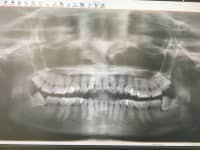A lot of my patients ask me the very same question and I would be more than glad to share with you my opinion on the matter for the benefit of other readers too.
I don't think I am wrong to say that no one likes to undergo wisdom tooth surgery! Or any surgery for the matter. Unless absolutely necessary of course.
So here is a quick summary of reasons and indications that would justify a recommendation to you to consider having wisdom tooth surgery:
1. Impacted wisdom teeth that are partially erupted with constant food trap leading to high risk of developing decay in the area due to inability to maintain good oral hygiene in the area.
2. A history of frequent bouts of Pericoronitis (infection of the gum flap partially covering a wisdom tooth)
3.Wisdom teeth that are badly broken down due to deep and extensive decay.
4. Sometimes as part of an orthodontic treatment plan (but on a case by case basis)
5. Presence of cysts or any other pathology around the roots of the wisdom tooth
6. A severe crack on the wisdom tooth due to trauma
7. Non-functional wisdom teeth without any opposing tooth that may have supra-erupted
8. A history of transient upper wisdom tooth aches linked to severe bouts of sinusitis.
This list is non-exhaustive and every case must be assessed on its own merits and a thorough risk- benefits analysis done.
Generally speaking, the benefits of having the surgery to have the tooth removed must outweigh the risks for the surgery, in order for the surgery to make sense.
Here are some situations whereby I would not recommend wisdom tooth surgery:
1. Deeply buried wisdom teeth that are unerupted and is in close proximity to the mandibular nerve.
2. Wisdom teeth that are not impacted and are in good function with opposing teeth.
3. In situations whereby the risk of the surgery is higher than the benefits of having the tooth removed.
I hope my answer helps you to get some clarity on the condition of your wisdom teeth and i wish you all the best in finding a good and experienced dentist that you trust and have rapport with.
Kind Regards,
Dr Gerald Tan








